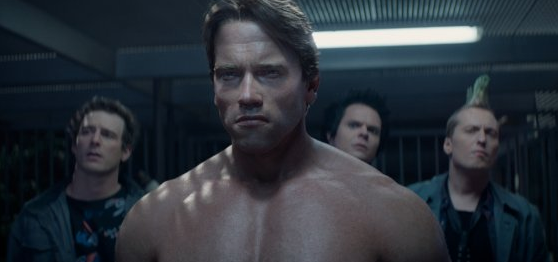Peter Suderman Reviews Terminator Genisys
Another empty nostalgia piece.
Like Kurt Loder (and most other critics), I didn't think much of Terminator Genisys, which is mostly a disappointing nostalgia piece.
Here's the opening to my review:
"Old — but not obsolete" is the knowing mantra that Arnold Schwarzenegger repeats throughout "Terminator: Genisys." Wrinkled and gray-haired, with a drooping face that seems designed for a spryer, thinner metal endoskeleton, Mr. Schwarzenegger, the no-longer-quite-so-muscle-bound action star, certainly looks the former. He plays the role with knowing, elderly charm; his gears may grind a little more, and his thinning flesh may expose his metallic insides more often, but robotic age becomes him.
Indeed, he seems to be enjoying his robo-dotage. Yet he also seems slightly out of place in this lackluster sequel, like an old man taking the grandkids to the video arcade. Yes, this hulking robotic brute is still the role he was born to play, but, more than ever, it seems like the role he was born too long ago to play.
The movie means to emphasize his senior stature while insisting that this ever-longer-in-the-tooth killer robot still hasn't lost its mettle; Mr. Schwarzenegger's unnamed android warrior is introduced in a scene that pits him against a buck-naked version of his younger self. Tellingly, though, he loses, saved at the last minute by one of the movie's younger stars.
Just as tellingly, Mr. Schwarzenegger's digitally recreated younger self is the movie's best and freshest special effect. The rest of this disappointing movie clearly yearns to recall the thrills of the franchise's groundbreaking first two films — and just as clearly fails. Contrary to Mr. Schwarzenegger's repeated mantra, what this bland and lifeless attempt at a franchise reboot really proves is that the series is long past the end of its useful life.
Like Mr. Schwarzenegger, this venerable 1980s franchise is now well past its prime, replaced by newer and flashier enterprises. Killer robots are old news now; if you have an iPhone, you know that Skynet has already taken over.
Fittingly, the movie reimagines the murderous sentient software — now called Genisys — as a kind of mobile OS-meets-social network. As one character explains, it ensures that "everything in my life is uploaded and online, 24-7." Welcome to the apocalypse, as brought to you by Facebook.
As I say in the piece, the multiple attempts to reboot or extend the franchise suggestjust how much goodwill there is towards the first two entries in the series.

The first half of the film takes viewers on a brief tour of the first Terminator, recreating and restaging key scenes from James Cameron's 1984 low-budget classic, this time with the inclusion of a T-1000, the villain from Cameron's 1991 follow-up, Terminator 2. The particulars are complicated and never fully make sense, but as a metaphor for the movie's relationship to its predecessors, it's perfectly clear: The movie spends its first hour essentially fighting the first two films.
There's a similar sort of fan service at work in Jurassic World, which includes constant references to Steven Spielberg's 1993 original. Jurassic World is, I think, a somewhat better movie than Genisys, but it's still an attempt to coast on audience appreciation for the original.
There seems to be an awful lot of nostalgia for films of that era—the 1980s and early 1990s—floating around Hollywood right now. In addition to this summer's Jurassic Park and Terminator updates, there are sequels, with the original stars, to Top Gun and Blade Runner in the works. The last few years have seen sequels to the Alien franchise, Die Hard, and Rambo, as well as the Expendables franchise, which channels a non-series specific form of 80s action nostalgia. The forthcoming Star Wars sequel arguably fits in this category too; yes, the first one hit theaters in the 1970s, but it remained a major phenomenon throughout the following decade.
To some extent this is just a result of the fact that Hollywood's current generation of top creators came of age during the 1980s and early 1990s, and these were the movies they grew up on. But I also think it suggests a deeper nostalgia for the big films of that era, more than a few of which were memorable and gripping in ways that today's frantic, CGI-heavy action blockbusters just aren't.
Maybe it's just today's middle-aged mavens pining for their youth, but I think there's a little more to it than that. The films from that era, even the ones that were initially considered too noisy and too flashy, now seem remarkably cool and calm in comparison to today's blockbusters. They're slower and more methodical, and even in the biggest budget pictures, computer-generated effects are used sparingly if at all. It was a golden age for blockbusters.
Ultimately, I think those old methods are what a lot of Hollywood's nostalgia are missing; movies like Jurassic World and Terminator Genisys resurrect characters and concepts from an earlier era, but not the style or craft that made those characters and concepts great.
The best Terminator 2 sequel never aired in theaters. Instead, it was T2 3-D: Battle Across Time, part of a James Cameron-directed 3-D movie/stunt show at Universal Studios. Watch a fun clip from the making-of documentary below:


Show Comments (44)